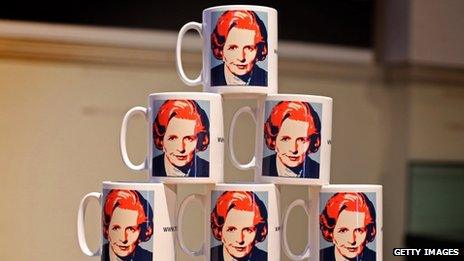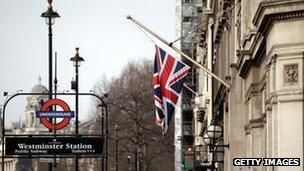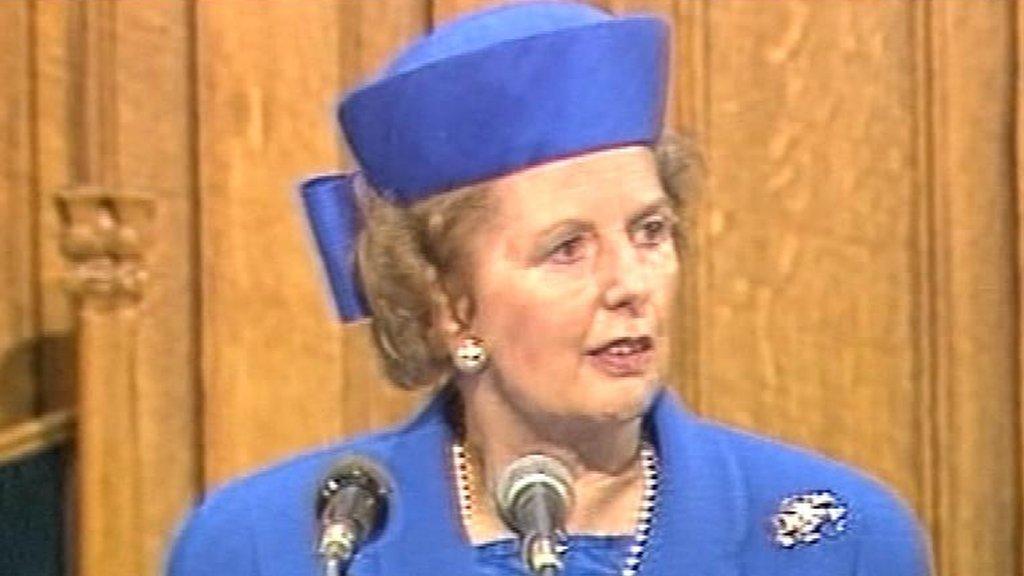What if there had been no Marmite Margaret?
- Published

Memorabilia confirms Margaret Thatcher's popularity - with some
Love her or loathe her, it's probably a bit obvious to say Margaret Thatcher provoked strong opinions. And looking back as one who came of age in the 1980s, she - and the myths built around here - made for an extraordinary presence.
It sometimes feels now that the 1980s could not have happened without her. Even while living through the decade, it felt like she defined the times.
If you loathed her, everything you disliked could be blamed on "Thatcher's Britain". If you loved her, nothing could have been achieved without her; to hear the praise for her international role, you'd think the Soviet Union would still be going if it hadn't been for the Iron Lady.
Neither side is right. The 1980s would have come and gone without Margaret Thatcher. The question is what difference she made. Or to put it another way, how would other politicians have shaped or reacted to the trends that were already under way, and pressures already building.
For historians, the game of "what if?" is a dangerous one. Not being a historian, I'll give it a try anyway, at least on the state of the economy, and the economy of the state.
Not for turning?
The economic pressures building by 1979 were of persistently high inflation. Much of industry was bad shape - a lot of it in the public sector and loss-making. And trade unions exerted a lot of power.
Whoever you blame for what had become known internationally in the 1970s as the "British disease", it needed a cure. It's simplistic to say that meant taming inflation and slaying the unions, as there was a problem also of poor quality British management.
Margaret Thatcher's biographer and devotee, Charles Moore, has argued today that, although she became known as a hugely divisive figure, she was not the instigator of division: Britain was already divided.
The biggest gear change in public spending had already been forced on the British government after 1976, when the Labour Government was forced to go to the International Monetary Fund to seek support. The IMF imposed tough conditions on public spending, which contributed to strife in industrial relations and within the Labour Party.
That's why, without Margaret Thatcher, it's a fair bet that another Tory leader would have led the party to victory in 1979. If it were the man she ousted, Edward Heath, or the man she beat in the leadership contest, Willie Whitelaw, it would probably have been a 'wetter' or One Nation Tory approach to change - less radical and seeking to go with the grain.
It's unlikely that another Tory would have been so forthright in forcing the pace, leading the Conservative Party from its radical right, and taking on dragons to slay, as a test of political virility.
Nevertheless, a Tory government under different leadership would surely have sought trade union reform, and continued with Labour's toughened approach on spending.
It would have been informed by the sense of failure that came out of the Heath government of 1970-74, when there had been a U-turn and effective defeat at the hands of the National Union of Mineworkers.
That failure was the catalyst for internal challenge from the right, led by ideologues including Keith Joseph, and which put Margaret Thatcher into the leadership. So even without her in Downing Street, a new leader would have been challenged from the right to show similar backbone.
Frontiers of the state
Would a different Conservative government have sought to sell off the many nationalised industries; steel, coal, shipbuilding, telecoms, gas, electricity, car manufacturing, much of the defence sector, later rail as well?
That is where many of the most divisive and painful decisions were felt, where communities that had been built around industries were exposed to the free market. In the coalfields, the steel towns and around the former shipyards; that's where the legacy remains painful a generation after Margaret Thatcher left office.

Flags were lowered to mark the death of the former prime minister
So would another prime minister have sought to reform these more gently within state ownership? The "what if?" question requires you to judge whether the Tories would have won a second term without Thatcher at the helm - a second term during which the privatisation agenda took root? And that, in turn, requires you to imagine that the Labour Party was electable in 1983.
After all, it wasn't Thatcher's doing that Labour's manifesto that year was known, by its own side, as "the longest suicide note in history", or that the splits gave rise to the Social Democrat Party, or that Argentina's General Galtieri offered himself up as another dragon for slaying, following his invasion of the Falklands.
There were big elements of Margaret Thatcher's political luck. The same factors might have kept another Tory leader in office, or a lack of resolve might not.
It's less clear that privatisation would have been pursued with anything like the vigour of Margaret Thatcher, as she "rolled back the frontiers of the state". In that, she led the world in a process that would quickly become a central condition imposed on other countries by the IMF and World Bank. It would later be embraced by the new nations of the collapsing Soviet bloc.
Oil boom
The pain inflicted on industrial communities - not least in Scotland - was not all down to the choices she made. At least as significant a factor was the high value of sterling in the early 1980s.
The taps had just been turned on North Sea oil revenues, and the resulting strong pound meant that any company in a trading sector, including steel, energy, cars and shipbuilding, was severely undermined by a sudden shift in the terms of trade - tougher exporting, much cheaper imports.
With that start to the era of North Sea revenue, the role of Margaret Thatcher was actually to do... not very much. She continued the previous government's approach to offshore revenue of absorbing revenue within general tax.
During the oil sector's boom years in the 1980s, that money was used to pay the bills for a deep recession, the loss of old industries, and the transition to a new type of economy. As with developments in other countries, it was more focussed on services, though in Britain, the growth was particularly in financial services.
Those funds were also used to allow for lower taxes. To free market ideologues, the best use of such a windfall was to put money into the pockets of those who could use it most efficiently, the private individual.
Where her privatisation programme made a difference was in selling off Britain's share of BP, and the British National Oil Corporation, which had been set up to take a stake in the North Sea under Labour.
Looking back now, we can see the alternative was both to retain that stake and to create a trust fund. Norway did both. In light of Britain's current predicament, it's an alternative that now looks quite attractive.
A bit more French
The choices made by the Thatcher government meant that it had more flexible employment, which meant more dynamism and perhaps more growth, but at the cost of labour market insecurity which continues today.
The choices made in the 1980s, to which Tony Blair would become heir, were for Britain to become more American in its economic model, and less European.
Would another leader have made the same choices? I'd argue Whitehall's choices would probably have been more nuanced.
Britain would be a little less individualistic, perhaps slightly less consumerist. And Britain's economy might have looked a bit more like that of France, where most of the 1980s were lived under a socialist presidency; with large nationalised companies, less flexible labour laws, greater social protection, but now facing deep-seated problems.
In short, Margaret Thatcher leaves a legacy, but it risks being overstated alongside the effect of changes that would have taken place anyway. In some areas, such as privatisation, she made the weather; in others, she rode the wave of history.
- Published8 April 2013
